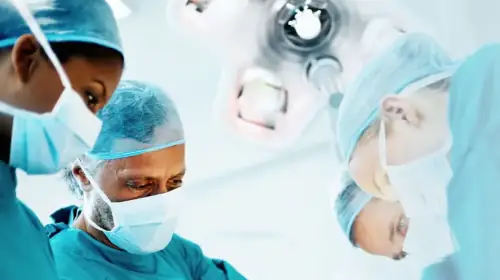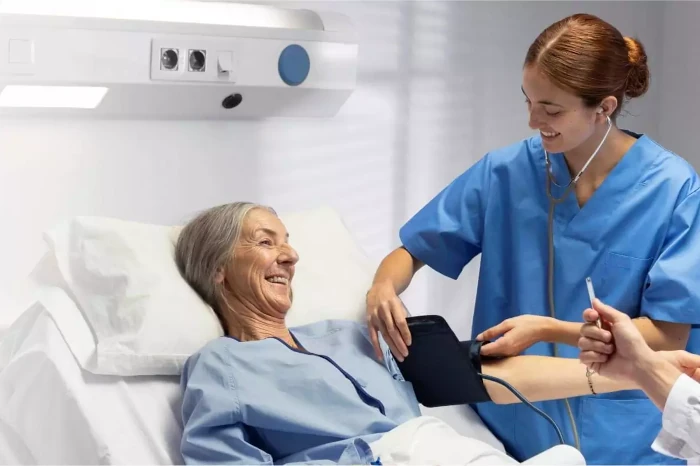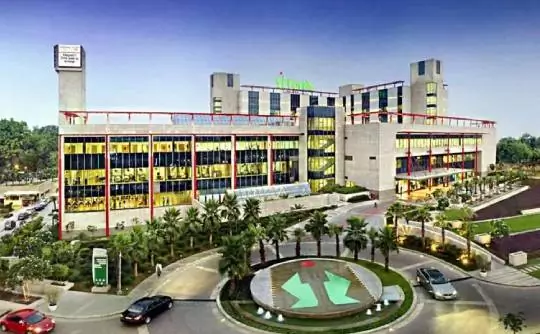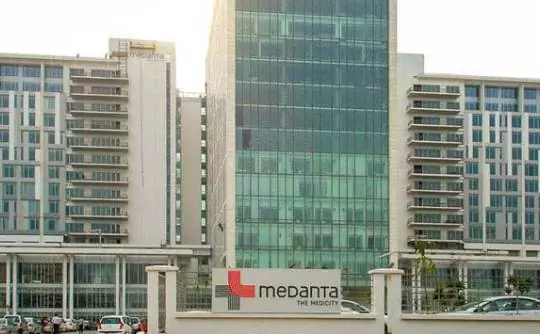

Whether you need an Autologous bone marrow transplant (bone marrow cells are derived from the patient himself) or an Allogeneic bone marrow transplant (a close match donates the bone marrow to the patient) predominantly determines the cost of a bone marrow transplant in India.
One of the key costs you will face when contemplating a bone marrow transplant surgery in India is the surgeon's fee. IndiCure connects you with board-certified surgeons in India who are highly skilled and have delivered successful transplantation surgeries over a long period of time. While the surgeon's fee can vary based on their experience and reputation, you can trust IndiCure Health Tours to recommend the surgeons who prioritize your safety and deliver excellent outcomes when you choose to have bone marrow transplant surgery done in India.
Choosing an accredited surgical facility with skilled and qualified medical staff is crucial for the success of a bone marrow transplant in India. In India, larger cities typically offer superior medical facilities and more experienced surgeons, resulting in higher costs for bone marrow transplant in India. IndiCure Health Tours specifically recommends surgical facilities in larger cities of India to prioritize quality of care and ensure patient safety.
Bone marrow transplant surgery related costs encompass both pre- and post-operative expenses. Pre-operative costs are influenced by factors such as the patient's age and medical condition, determining the necessity and type of investigations needed. Post-operative expenses may involve prescribed medications and subsequent follow-up appointments.
At IndiCure Health Tours, we consolidate most of the expenses for your bone marrow transplant in India to provide you with an inclusive and cost-effective package tailored to your budget and individual requirements. After receiving medical reports, your case manager will provide an estimated cost based on a discussion with the surgeon.
The final bone marrow transplant cost in India can however be confirmed after your face-to-face consultation with the surgeon.

We Help you Choose the Right Treatment, Surgeon & Hospital

We Arrange Video/Telephonic Consultation with the Surgeon

We Assist you with Visa & Accommodation

We Receive you at the Airport and Drop you at Hotel/Hospital

We Assist you the at Hospital & Provide Post Operative Support
IndiCure Health Tours offers exclusive savings on your medical travel to India. We partner with the best hospitals in India at special rates, ensuring you get the best possible healthcare at the most affordable prices when you plan medical travel with us.

Here is a set of questions you should consider asking before commencing your journey for a bone marrow transplant in India.
Prepare to answer questions about your:
Bone marrow is an essential spongy, fatty tissue substance present inside the bones of the human body. It produces the blood-forming cells in the human body that include :
Apart from these cells, the bone marrow also contains hematopoietic stem cells (HSC) which are unspecialized and immature stem cells that have the ability to divide and become either the stem cell or differentiate and mature into other different kinds of blood cells.
Bone marrow cells start to malfunction as a result of diseases like leukemia, aplastic anemia, cancers, or other immune deficiency disorders and start yielding defective or abnormal blood cells that affect the normal functioning of the human body.
Bone marrow transplant is required when the bone marrow in the human body is not healthy enough to perform its normal function which can be due to any disease, chronic infections, or aggressive cancer treatments.
Some of the common reasons to undergo bone marrow transplant include:
Allogeneic bone marrow transplant: When the donor is some other person whose tissue has the same genetic type as the patient, the bone marrow transplant is termed as allogeneic transplant. The donor is most likely to be a brother or sister of the patient. However, it is only in 35% of the cases that a sibling's marrow is a perfect match.
Autologous bone marrow transplant: When healthy stem cells are taken from the patient's own body and replaced with diseased blood cells, the procedure is termed as autologous bone marrow transplant.
Bone Marrow Transplant is a complex and major procedure. There are risks and complications associated with the procedure and the procedure is thus recommended to select few patients when other treatments have failed.
Bone Marrow Transplant is recommended if other treatments are not working and there is a higher risk of the condition returning without the transplant and if the physician feels that the benefits of the transplant outweigh the risks associated with the procedure. The best candidates for bone marrow transplant are those in otherwise good health and have stem cells available from a sibling, or another family member.
The procedure needs meticulous planning and the surgeon thoroughly assesses the patient to make sure that he/she is healthy enough to survive and accept the transplant. For this, a series of tests are done to assess the patient's vital organs like heart, lungs, kidneys, and liver to ensure the patient is physically capable of accepting the transplant.
If the surgeon thinks that a transplant can be done, he proceeds with harvesting of stem cells.
If the patient is undergoing an allogeneic transplant, bone marrow is harvested from the donor one or two days prior to the transplant procedure. The stem cells are collected in two ways:
Before the transplant, the patient undergoes chemotherapy or radiation therapy to kill the cancerous cells and to make room for the new bone marrow cells often known as conditioning of the patient.
For transplant, the central venous catheter or a port is installed on the upper right portion of the chest wall of the patient and the new stem cells are infused through this port that helps them to flow directly to your heart from where they are dispersed all over the body through the blood. Gradually the cells become established in the bone marrow to grow.
The post is kept at the same place as the infusion is done in multiple sessions that aid the new stem cells to integrate into the body. This process is known as engraftment. The patient receives the blood transfusion, fluids, antibiotics, and platelet transfusion through this port so as to fight the infection and to help your body accept the new marrow.
After the infusion, you will be closely monitored for any signs of complications or rejection. Precautions are taken to prevent any infections. The patient is constantly monitored to check if engraftment has occurred or not and to monitor organ function. Once the healthy bone marrow begins to produce normal cells, transfusion is stopped.
Recovery after a bone marrow transplant is a long and stressful process for both the patient and the family. The initial few weeks are very critical as there are high chances of complications and rejections of the transplant.
But, subsequently, the patient starts to feel better as the blood count begins to grow and his immune system becomes stronger. Full recovery may take up to a year or two.
You shall need a total of 16-18 weeks for a bone marrow transplant in India after which you can fly back to your country.
It is a complex but lifesaving procedure that has improved in the past few years. After a successful bone marrow transplant, you will be able to live a normal life once again which was not possible otherwise.

Gurgaon
Fortis Memorial Research Institute (FMRI), the flagship hospital of Fortis Healthcare, is a multi-specialty, quaternary care hospital and is counted among the best hospitals in India and the world. The hospital is considered as "Mecca of Healthcare" and a referral hospital, not only in the entire Asia Pacific but much beyond.
The hospital boasts of an enviable International faculty- the clinicians considered to be among the best doctors in the world and even specialty nurses offer nothing but the best in clinical care. The hospital has the most modern, state-of-the-art, cutting-edge technology in the hands of the most technically sound technicians, who offer clinical excellence beyond comparison.

Gurgaon
The Medicity is one of India's largest multi super-specialty institutes located in Gurgaon, National Capital Region (NCR-DELHI). Founded by one of the most renowned cardiac surgeons in India, Dr. Naresh Trehan, Medanta was established with the aim to provide the highest standards of medical care to patients backed by clinical research.
Spread across 43 acres, the institute includes a research center, medical and nursing school. It has 1250 beds and over 350 critical care beds with 37 operation theatres catering to over 20 specialties. Backed by the latest and most advanced technology, the institute is counted among the best medical institution in the world and attracts lots of patients from across the globe.
Your reports will be reviewed by the consultant surgeon, who will then decide on the best treatment option for you.
At IndiCure, we make certain that you receive only the best diagnosis and treatment for your illness. You can rest assured that you will receive the greatest treatment guidance from India's best surgeons.
When a patient's bone marrow is sick or damaged, and he or she is unable to create excellent, healthy blood cells, a stem cell transplant from a donor is required. If a person's tissues closely match those of the patient, he or she is eligible to be a BMT donor.
A matching donor is usually a member of the immediate family, such as a kid, a sister or brother, or a parent. However, if a person is lucky, he or she may be able to find the perfect volunteer fit. A perfect match is not required, but a close match with a favorable conclusion is required.
The success rate of Bone Marrow transplant in India is as good as anywhere else in the world. Patients who received an allogeneic transplant for a non-malignant illness had a success probability of 70 to 90% with a related match and 36 to 65 percent with an unrelated donor, according to statistics.
For disorders including Ewing sarcoma, Wilms tumor, germ cell tumor, and neuroblastoma, autologous bone marrow transplant has a high success rate.
Stem cells from your blood or a donor's blood are used in a stem cell transplant. A peripheral blood stem cell transplant is another name for this procedure. Stem cells from your bone marrow or a donor's bone marrow are used in a bone marrow transplant.
Bone marrow transplant is a serious surgery. A bone marrow transplant is fraught with risks. A bone marrow transplant can cause minor difficulties in some people, but it can also cause major complications that require treatment or hospitalization in others.
Long-term negative effects from bone marrow donation are quite rare. The immune system of the donor remains healthy, and their blood stem cells regenerate in 4 to 6 weeks. Your immune system remains strong because only 1 to 5% of your marrow is required to save the patient's life.
The recovery time for autologous bone marrow transplants is usually one month, while the recovery time for allogeneic bone marrow transplants is at least three months. After 10 to 20 days after the transplant, the blood count normally begins to improve. The patient is constantly checked throughout the procedure to keep infections at bay. When a patient's blood count improves, his or her medical condition improves as well.
It's natural to feel concerned after undergoing a sophisticated and lengthy BMT treatment in India, and to return to a daily routine in order to regain some sense of normalcy.
However, once the transplant is complete, you should focus all of your concentration on restoring your health and stamina. Maintaining a cheerful attitude will aid in your recovery. It's also a good idea to stay away from crowded public places because you'll be more susceptible to infection owing to your weakened immune system. In general, it takes about 3-6 months for a patient to feel better and stable, however this can vary depending on ambient factors such as cleanliness.
In addition to the cost of surgery for Bone Marrow Transplant in India, there are several other expenses you should plan for when organizing your medical trip. These include:
By accounting for these additional expenses along with the Bone Marrow Transplant cost in India, you can create a comprehensive budget to ensure a smooth, comfortable recovery experience.
Enhance your medical journey to India by availing these extra services.
Traveling abroad for medical reasons may be challenging. With our experience of over a decade and working with the best surgeons and top hospitals in India, we help make your medical tour easier and safer for you. We will guide you at every step of the way and make end-to-end arrangements for your surgery, travel, and stay.
Ramandeep Dhaliwal
I had great experience having rhinoplasty through Indicure. Dr. Ruchika from Indicure has helped me in finding best plastic surgeon, answering all my questions...
Read More
Joshua Archer
My name is Joshua Archer I'm from New Zealand, bay of plenty, kawerau I opted for the bypass surgery in January 2023 but planned it in advance for 28 September found IndiCure...
Read More
Kera Ren
Absolutely loved my experience with IndiCure - from first inquiring to meeting the surgeon pre op to my follow up post op. The surgeon was extremely approachable...
Read More
Andreana Paul
Had a wonderful experience. Visited India for my plastic surgery. From sending mails, airport pickup, comfortable accommodation and, to smooth hospital appointment booking...
Read More
Brandi Luce
I had the privilege of using Indicure's services for a cosmetic procedure that I had wanted for a long time but had always been apprehensive about. Ruchika helped me...
Read More
Jade M
Indicure Health Tours went above and beyond my expectations. They helped me with every aspect of my journey and were professional, kind and caring. I was...
Read More
The content on the website (www.indicure.com) is intended to be general information and is provided only as a service. All photographs on our website of before and after results are examples only, and do not constitute an implied or any other kind of certainty for the result of surgery.
Learn about IndiCure Health Tours' comprehensive editorial policy that strives to deliver trustworthy, helpful, relevant, accurate and people-first content on medical tourism in India.
It is not medical advice and should not be taken as medical advice. It should not be used to diagnose or treat a health condition and is in no way meant to be a substitute for professional medical care. You are advised to see a surgeon in person to assess what surgery may or may not accomplish for you.
It is also important to keep your expectations realistic and to understand that all surgical procedures carry risks and should never be taken lightly.